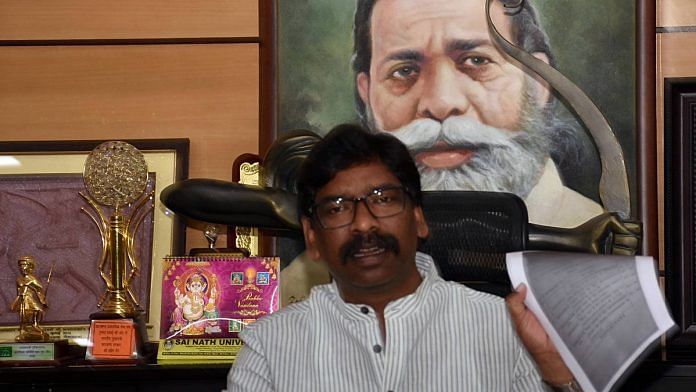New Delhi: If there is a man of the match in the Jharkhand assembly elections, it has to be Jharkhand Mukti Morcha (JMM) chief Hemant Soren.
For, the 44-year-old Soren was not only the face of the opposition alliance but has also become one of the few new generation leaders to successfully claim the legacy of his father after being projected as the chief ministerial face of the JMM-Congress-RJD alliance.
Soren is the son of three-time chief minister Shibu Soren. He led the alliance from the front, campaigning in all the alliance seats at least once even as former Congress president Rahul Gandhi was mostly a leader in absentia, taking part in just four rallies in the state.
“Very early in the campaign, Soren decided that he will not be bogged down by the complexities of the alliance. It was clear that there was infighting within the Congress but he stayed focused,” a senior JMM leader, who did not want to be named, told ThePrint.
That front-foot effort, political analysts say, helped the JMM expand its footprint to even its non-traditional seats such as Latehar and Palamu.
“After the 2014 assembly elections rout, the party made a very conscious decision to build a pan-Jharkhand identity,” said professor B.K. Sinha, head of the political science department at St. Xavier’s College, Ranchi.
Until then, the JMM’s voter base was mainly limited to the tribal belt of Santhal Parganas; tribals constitute 26.2 per cent of Jharkhand’s population.
In the 2014 assembly elections, for instance, the JMM won just 19 seats against the BJP’s 37. In these polls, of the 43 seats that it has contested from, as of 6.30 pm, the JMM was leading in 30. “This is a 70 per cent conversion rate,” Sinha said. “This is unprecedented for an opposition party since the BJP wave began in 2014.”
Also read: Why the defeat for ally BJP in Jharkhand is making JD(U) leaders happy
A turnaround that took time
The turnaround in the JMM’s fortunes, however, didn’t happen overnight.
In 2014, Soren, a Santhal, faced ignominy after losing from his party turf of Dumka to the BJP’s Louis Marandi. The party fared no better in the 2019 Lok Sabha elections, with patriarch Shibu Soren losing by a margin of over 47,000 votes from Dumka.
This time, however, there was a vindication of sorts — Soren not only won from the family pocketborough of Dumka by over 13,000 votes but also from Barhait by over 24,000 votes.
JMM leaders said it took the party a while to get its act together. They said Soren was very clear from the beginning that his focus was the 2019 assembly elections and his party began strategising accordingly.
“JMM got into campaign mode very early in the day. Also where the BJP’s campaign mainly revolved around its national leaders, the alliance campaign was woven around Soren as the CM face,” said the Jharkhand-based political analyst Dr Harishwar Dayal.
The early campaign
Starting in September 2018, the JMM launched a Sangharsh Yatra, an outreach programme aimed at local residents, in which Soren went to each of the 281 administrative blocks and held rallies, youth connect programs and honoured the tribal martyrs.
“The idea was to keep it localised instead of focusing on the Modi-Shah duo,” said the party leader quoted above.
The outreach programme was supplemented by a digital initiative. “A back-end team worked round-the-clock, putting his rallies and youth connect programmes live on Facebook and Twitter.”
The party roped in 15 young professionals to handle its social media. The team trained some 200 JMM volunteers to man and update the party’s Twitter and Facebook pages.
Once its initial outreach effort ended, the party followed it up with a Badlaav Yatra (journey for change), in which he met different interest groups such as Anganwadi workers and para-teachers and talked to them about the problems they were facing. The yatra began at Sahebganj, in the heart of Santhal Paragana, and ended at Ranchi.
There were, however, hiccups along the way with the BJP frequently targeting Soren for allying with the Congress, which had been against creating a separate state. In almost every rally he addressed, Home Minister Amit Shah spoke of how the JMM had joined hands with a party that had “shot at youths agitating for a separate state”.
The BJP also accused Soren and his family of appropriating tribal land, a charge that Soren denies vehemently. In an earlier interview to ThePrint, Soren had said that the personal attacks are an indication of the BJP’s desperation.
Political analysts say it will now be interesting to see how Soren establishes himself as an administrator.
“He had two short stints in government — one as CM and the second as deputy CM. But he was considered a shadow of his father Shibu Soren,” Dr Dayal said. “So, it will be interesting to see how he handles the pressure of coalition politics and runs the administration.”
Beyond politics, Soren, a close aide said, is a family man who loves to spend his time with his two young sons. “He loves spending time with his family. He also likes to spend time with his father,” said the aide.
Also read: 5 reasons why BJP lost Jharkhand assembly elections



